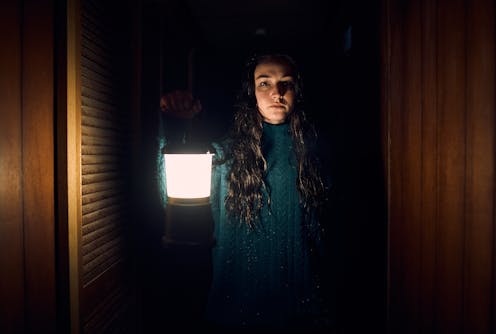the unsettling new Aussie horror You’ll Never Find Me
- Written by Erin Harrington, Senior Lecturer in English and Cultural Studies, University of Canterbury

In the middle of the night, during a terrible thunderstorm, a sodden stranger knocks on Patrick’s door hoping to use a phone. Insomniac Patrick (Brendan Rock) is a paranoid, bearded loner who sits alone in his dimly-lit mobile home as if he is waiting for a dawn that may never come. The nameless, barefoot visitor (Jordan Cowan), a 20-something woman with long dark hair and haunted eyes, seems unsure if she’s stumbled across a saviour, or a predator.
This unexpected encounter opens the Australian psychological horror film You’ll Never Find Me, an unsettling and economical chamber piece that makes effective use of its limited location and its dialogue-heavy script.
Shifting identities
We begin the film unsure about either character’s identity or motivations. “I’m afraid you’ve knocked on the wrong door,” drawls Patrick mournfully.
He shows the visitor initially reluctant but surprisingly tender hospitality and she is uncertain how to respond. At time drags on, Patrick demonstrates a deep willingness to wax lyrical about his take on life’s difficulties. “It’s nice to pass the time with a stranger,” he confesses.
As the storm knocks out the power, it’s unclear whether the visitor will be able to leave. It’s also obvious something more ominous and perhaps infernal is unfolding.
Directed by Josiah Allen and Indianna Bell, the film offers a gothic, moody ambience. The mobile home is isolated from others in the park. It presents a claustrophobic environment and comes to be a character in its own right: it creaks and groans like a ship riding the waves.
The shadowy space seems simultaneously too cramped and too spacious, as if everything is being slowly sucked into the strange, curtained-off section at the back of the home. Ratty 1970s décor aside, time does not seem to be passing in a legible manner, something emphasised through an unsettling string-heavy score and slow, invasive tracking shots.
Information is doled out carefully. The visitor finds odd mementos stashed around the house and is confused at her own inability to keep her story straight. Patrick picks anxiously at the edges of forgotten memories, repeatedly describing the night, and his recollections, as “strange”.
Is this all an insomniac’s drifting thoughts, or the pair’s subjective experience of mutual distrust and paranoia? Has the young woman come looking for Patrick, or has he somehow summoned her?
A careful dance
You’ll Never Find Me builds successfully on a “golden decade” of Australian horror.
This period has showcased diverse innovative and internationally-acclaimed films, ranging from maternal horrors The Babadook (2014) and Relic (2020), to found footage 70s throwback Late Night with the Devil (2023) and runaway hit supernatural horror Talk to Me (2023).
Read more: 10 years of homegrown horror hits: Talk To Me and the golden age of Aussie horror
You’ll Never Find Me also illustrates the importance of an industry pipeline. Writer/director Bell and co-director Allen, as Stakeout Films, found earlier success with shorts Safe Space (2019), Call Connect. (2019) and The Recordist (2020), some of which also featured performances from Rock and Cowan. Each short plays across genres, featuring evocative soundscapes, moody lighting, tense relationships and claustrophobic settings.
These prior relationships are evident in the film’s confident tone and performances. Cowan and Rock have a compelling chemistry. Extreme close ups on their faces and bodies chart the film’s careful, slow-burn dance between threat and disclosure, or vulnerability and dread.
The pair move through odd, circular conversations about their life philosophies and past experiences, as if we are watching a play. We’re aware we are witnessing a careful dance – but for a long time it is unclear who might be the biggest threat to whom.
“You’re the one who knocked on my door,” Patrick reminds the visitor, as she becomes increasingly insistent about wanting to leave. Throughout, he posits whether this visitation was a matter of choice or chance, even as the true and terrible nature of the pair’s encounter makes itself known.
You’ll Never Find Me will appeal to audiences who appreciate a rich atmosphere, character-led drama, and creeping yet tense pacing.
For its many strengths, though, the film may divide audiences with its chaotic, surreal final act. As the pair’s conflict comes to a head, the world of the film tilts in a lurid burst of colour, and the narrative doglegs into a conceit that is challenging to pull off.
Some may see this climax as a fitting conclusion that upends some of our assumptions about character, relationships and motivation. Some, including myself, may find this nightmarish sequence, and the film’s denouement, displaces much of the film’s fine earlier work – particularly its manipulation of space and point-of-view – in a frustrating manner.
There is no doubt, though, this film exhibits a distinct sensibility, captivating performances and an exceptionally queasy atmosphere. It is further proof low-budget Australian horror is currently a site of significant innovation, and it successfully showcases Bell and Allen’s ability to do an awful lot with limited resources.
You’ll Never Find Me is out now in Australia and Aotearoa New Zealand.
Read more: ‘Analog uncanny’: how this weird and experimental side of TikTok is forging the future of horror
Authors: Erin Harrington, Senior Lecturer in English and Cultural Studies, University of Canterbury





